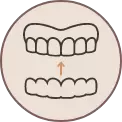How Painful Are Tooth Implants? Discover How Long To Expect Discomfort
- How Painful Are Tooth Implants?
- How Long After Dental Implant Surgery Will You Feel Discomfort?
- What Complications Can Come from Dental Implants?
- What to Do if You Experience Discomfort Years After Dental Implant Surgery
- How to Prevent Discomfort in Your Dental Implants?
- Learn More About Dental Implant Surgery
Dental implants are one of the most effective dental restoration treatments. However, because this procedure involves embedding a dental implant directly into the jawbone, some people experience discomfort after the procedure.
Some people considering dental implant surgery are worried about how painful are tooth implants. They may also be concerned about how long after the treatment the discomfort lasts.
How Painful Are Tooth Implants?
Dental implant surgery is a minimally invasive procedure with some post-operative discomfort. Traditional dental implant surgery involves making a small incision in the gum line and exposing the jawbone. Your dentist then drills small holes into the jawbone to place the dental implants. During this procedure, you are usually under local anaesthesia, so you won’t feel any discomfort from the dental implants.
Our dentists use a computer-guided, flapless surgical technique to place DIO dental implants at Dentistry on Solent for your comfort. Using this technique allows for less discomfort and quicker recovery. Computer-guided surgery involves the creation of a surgical template using CAD/CAM technology.
Your dentist scans your mouth using an intraoral scanner, and the data is input into the DIO Navi software program. The program carefully plans the surgery, including the embedding angle, location, and implant diameter. The information is used to create a template, which is placed in your mouth during dental implant surgery.
Your dentist uses the template to embed the implants directly through the gum tissue into the bone underneath, so no incisions or sutures are necessary.
How Long After Dental Implant Surgery Will You Feel Discomfort?
You may experience some discomfort near your dental implant site for up to five days after your dental implant surgery. Swelling, bruising, and jaw stiffness should heal within seven to ten days.
Other symptoms of discomfort after surgery include:
- Bleeding in the surgical site
- Minor swelling in the gums and face
- Discomfort in the jaw
Your dentist will give you instructions to help you manage your discomfort after the procedure. They include:
- Limiting of strenuous activity for the first few days after your procedure
- Consuming a soft food diet while excluding hard, sweet, and spicy food to prevent irritation of your dental implant site
- Using ice packs to minimise swelling and discomfort
- Avoiding tobacco products and alcohol to let your site heal
- Taking anti-inflammatory medications
With proper rest and care, you can manage discomfort and swelling after the first few days of your surgery. If your dental implants move slightly or you still feel discomfort after a few weeks, you should consult your dentist.
Fever, swelling, nausea, and excessive bleeding may cause more discomfort. Your dentist needs to address the situation as soon as possible to avoid further complications.
What Complications Can Come from Dental Implants?
Dental implants usually have high success rates, as high as 95% for many patients. However, some complications may arise because of the procedure. If you notice any complications, see your dentist immediately. Complications can include:
Infection
Bacteria may enter your dental implant site and cause an infection called peri-implantitis. Your dentist may need to assess the severity and location of the infection to give the proper treatment. If you see swollen gums, pus, and other signs of infection, you may need additional procedures to help treat the problem.
Gum Recession
It is possible the gum tissue around the dental implants may recede. As a result, you may experience inflammation and discomfort. You must see your dentist as soon as possible for a gum graft or soft tissue augmentation to avoid the removal of your dental implant.
Nerve Damage
Your dentist must address a nerve issue stemming from your dental implant surgery. An injury to the inferior alveolar nerve is severe and can include symptoms such as:
- Continual numbness in the dental implant site, lower lip, and chin
- Persistent discomfort
- Gums and skin feel tingly, ticklish, or feel like they are burning
Since nerve damage may have long-term consequences, including dental implant removal, talk with your dentist about the risks before having dental implant surgery.
Sinus Problems
If you have dental implant surgery in the upper jaw, it may result in the implants protruding into the sinuses. Their protrusion may cause sinusitis with symptoms such as:
- Facial congestion
- Yellow or green mucus from the back of the throat
- Loss of smell or taste
- Bad breath odour
- Toothache
- Fatigue
- High temperature
What to Do if You Experience Discomfort Years After Dental Implant Surgery
Your implants may be successful initially, but complications may occur years later. Your dentist may need to assess your implant site if you have discomfort at any time after the surgery.
If you experience discomfort when pressing on your implant site, you may have an infection or implant rejection. Other symptoms that may indicate an implant failure include:
- Loss of bone
- The implant can move horizontally
- The dental implant site appears inflamed
- The dentist cannot place a dental crown properly
The risk of dental implant failure increases because of bacterial growth, previous gum disease, smoking, or untreated diabetes. If you neglect your oral health care, bacteria may build up around your dental implants, resulting in peri-implant disease and additional inflammation and discomfort.

How to Prevent Discomfort in Your Dental Implants?
Dental implants require regular cleanings, dental checks, and careful home care to prolong their lifespan. Brushing lightly around your dental implants may stop an infection from occurring. Your dentist may recommend using an interdental toothbrush to clean hard-to-reach areas around your teeth, gums, and implants.
Regular dental checkups help ensure the long-term stability and function of your health. Getting professional dental cleanings can help remove bacteria from below the gum line and prevent infection.
Learn More About Dental Implant Surgery
Although there is some minor discomfort after surgery, dental implants are a successful, long-lasting tooth replacement option when you practice regular hygiene habits. If you are interested in receiving dental implants, you can discuss your concerns regarding how painful are tooth implants with our dentists at Dentistry on Solent.
If you want to know more about our dental implant treatments and other dental services, call us on (02) 9158 6137.
Note: Any surgical or invasive procedure carries risks. Before proceeding, you should seek a second opinion from an appropriately qualified health practitioner.
References
Is It Common to Experience Pain After Getting Dental Implants?
https://www.healthline.com/health/dental-and-oral-health/dental-implant-pain
Evaluation of survival and success rates of dental implants reported in longitudinal studies with a follow-up period of at least 10 years: a systematic review
https://www.ijoms.com/article/S0901-5027(14)00425-1/fulltext
What problems can occur after dental implant surgery?
https://www.medicalnewstoday.com/articles/dental-implants-problems
Inferior Alveolar Nerve Injuries Following Implant Placement – Importance of Early Diagnosis and Treatment: a Systematic Review
https://www.ncbi.nlm.nih.gov/pmc/articles/PMC4306320/
Treatment of dental implant displacement into the maxillary sinus
https://jkamprs.springeropen.com/articles/10.1186/s40902-017-0133-1
Sinusitis and Allergy
https://www.allergy.org.au/patients/allergic-rhinitis-hay-fever-and-sinusitis/sinusitis-and-allergy



































